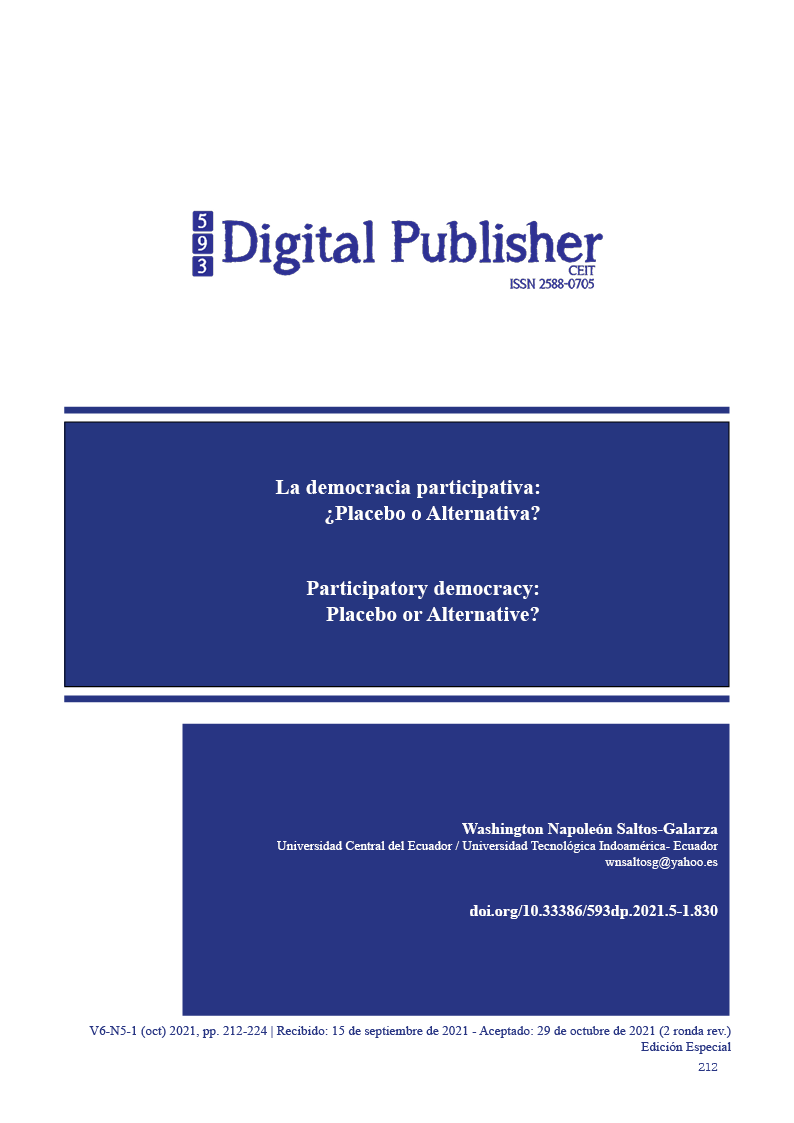Participatory democracy: Placebo or Alternative?
Main Article Content
Abstract
Faced with the crisis of liberal representative democracy, the solutions have pointed to three main directions: the reduction of democracy to its minimum form, as polyarchy, the expansion of representative democracy with participatory democracy devices and electoral reengineering processes, and the constituent reforms of the State in a baroque combination of guaranteeist-neoconstitutionalist-neoinstitutionalist visions. By regulation, the participation mechanisms, the popular initiative to call consultations, the presentation of bills or the revocation of mandates, have been expanded. But, in practice, they have functioned more as placebos in a supervised democracy, to keep citizens in check, than as mechanisms for participation. The result is that the arrow of democracy, which, starting from the returns in the eighties, pointed to the expansion and strengthening of democracy, has been reversed and is oriented towards forms of authoritarian democracy, with new strategies of discipline and control. The tendency, from the dominant power, is to build a binary between representative democracy and participatory democracy, which hides the emergence of antisystemic seeds of disconnection beyond the State and the market, under forms of direct, community democracy, new forms of power from the society.
Downloads
Article Details

This work is licensed under a Creative Commons Attribution-NonCommercial-ShareAlike 4.0 International License.
1. Derechos de autor
Las obras que se publican en 593 Digital Publisher CEIT están sujetas a los siguientes términos:
1.1. 593 Digital Publisher CEIT, conserva los derechos patrimoniales (copyright) de las obras publicadas, favorece y permite la reutilización de las mismas bajo la licencia Licencia Creative Commons 4.0 de Reconocimiento-NoComercial-CompartirIgual 4.0, por lo cual se pueden copiar, usar, difundir, transmitir y exponer públicamente, siempre que:
1.1.a. Se cite la autoría y fuente original de su publicación (revista, editorial, URL).
1.1.b. No se usen para fines comerciales u onerosos.
1.1.c. Se mencione la existencia y especificaciones de esta licencia de uso.
References
Acosta, A., & Hurtado, F. (07 de Julio de 2016). De la violación del Mandato Minero al festín minero del siglo XXI. Rebelión. Obtenido de https://rebelion.org/de-la-violacion-del-mandato-minero-al-festin-minero-del-siglo-xxi/
Bobbio, N. (1986). El futuro de la democracia. México: Fondo de Cultura Económica.
Dahl, R. (1997). La poliarquía. Madrid: Tecnos.
De Sousa Santos, B. (2006). Renovar la teoría crítica y reiniventar la emancipación social. Buenos Aires: Ecnuentros.
Grijalva, A. (2017). Capítulo II. Un balance de la Participación en la Constitución ecuatoriana del 2008. En A. Martínez, & T. (. Verdugo, Tensiones y contradicciones de la democracia ecuatoriana (págs. 59-96). Cuenca: Universidad de Cuenca, Facultad de Jurisprudencia, Ciencias Políticas y Sociales.
Habermas, J. (1999). Tres modelos de democracia. Sobre el concepto de una democracia deliberativa. En J. Habermas, La inclusión del otro (págs. 231-246). Barcelona: Paidós.
Hocquenghem, G. (2009). El deseo homosexual. España: Editorial Melusina.
Montaño, D. (3 de Marzo de 2021). Consulta popular en Cuenca: ¿una victoria contra la minería o el inicio de otra batalla legal? Obtenido de Monganbay Latam: https://es.mongabay.com/2021/03/consulta-popular-prohiben-mineria-en-cuenca-ecuador/
Mudd, G. (2009). Sustainability Reporting and Water Resources: a Preliminary Assessment of Embodied Water and Sustainable Mining. Mine Water Environ(27), 136-144.
Pachano, S. (1996). Democracia sin sociedad. Quito: ILDIS.
Pérez, C. (2011). Consulta Popular ¿camino a la democracia o al totalitarismo? Cuenca.
Ramírez, F., & Rubio, S. (2013). Ramírez,Nuda política: participación, democracia y conflictos. Ecuador2009-2012. Quito: FES-ILDIS.
Ranciére, J. J. (1996). El desacuerdo. Política y filosofía. Buenos Aires: Ediciones Nueva Visión.
Salazar, A. (2014). Los que no asisten, también existen. Un balance de los presupuestos participativos en en cantón Cuenca. En J. M. Canales, & A. Martínez, El buen gobierno desde una perspectiva iberoamericana. Un especial análisis del caso ecuatoriano (págs. 107-124). Cuenca: Facultad de Ciencias Económicas y Administrativas de la Universidad de Cuenca.
Saltos, N. (2016). Gobiernos progresistas: Revolución Ciudadana y Revolución Bolivariana. Política comparada de las reformas constituyentes y de las variacionesde la hegemonía en los gobiernos “progresistas”. Madrid: Editorial Académica Española.
Verdesoto, L., & Ardaya, G. (2018). Las consultas populares en la democracia ecuatoriana. Quito: Plataforma para la defensa de la democracia y los derechos humanos.


